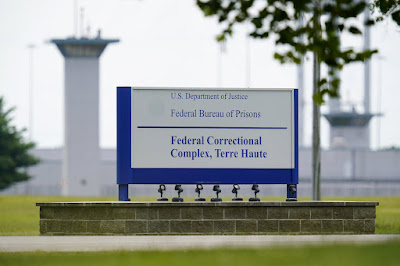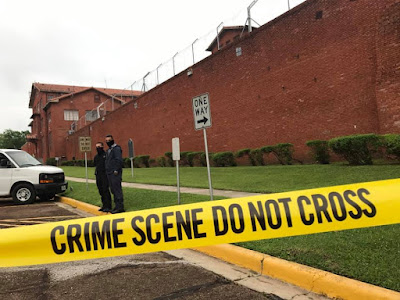 |
| Robert Melson |
(MONTGOMERY, Ala.) — Alabama is preparing to execute an inmate for the shooting deaths of three fast food restaurant workers during a 1994 robbery.
Robert Bryant Melson, 46, is scheduled to die by lethal injection Thursday evening at a south Alabama prison.
State prosecutors said Melson and another man who used to work at the restaurant, robbed a Popeye's in Gadsden, 60 miles (96 kilometers) northeast of Birmingham.
They said Melson opened fire on four employees in the restaurant's freezer. Nathaniel Baker, Tamika Collins and Darrell Collier were killed.
The surviving employee, Bryant Archer, crawled for help and was able to identify one of the robbers as the former worker. While he could not identify Melson, prosecutors said Melson told police he had been with the former employee that night. A shoeprint behind the store matched Melson's shoes, they said.
The Alabama Supreme Court and the 11th U.S. Circuit Court of Appeals both refused Thursday to stay Melson's execution.
Melson's attorneys asked appellate courts to halt the execution in order to review the constitutionality of Alabama's lethal injection protocol. Melson and other inmates are appealing a judge's dismissal of lawsuits that argued Alabama plans to use the sedative midazolam has been linked to what they say were problematic executions.
Some states have turned to the sedative as other lethal injection drugs became difficult to obtain. They argue a federal judge prematurely dismissed their lawsuits challenging the constitutionality of the state's death penalty procedures.
Midazolam is supposed to prevent inmates from feeling pain before other drugs are given to stop their lungs and heart, but several executions in which inmates lurched or coughed have raised questions about its use. An inmate in Alabama coughed and heaved for the first 13 minutes of an execution held in December.
Melson's attorney argued that midazolam does not anesthetize an inmate, but they look still, because a second drug, a paralytic, prevents them from moving.
"Alabama's execution protocol is an illusion. It creates the illusion of a peaceful death when in truth, it is anything but," Melson's attorneys wrote in the filing to the Alabama Supreme Court. "It should not allow Mr. Melson's execution to go forward in the face of botched executions and significant challenges to the constitutionality of Alabama's execution protocol."
The 11th Circuit did not rule on the merits of Melson's claim when it issued the first stay. Judges said they were issuing the stay to avoid prejudging the other inmates' appeals.
The Alabama attorney general's office has argued midazolam's use has been upheld by the U.S. Supreme Court and it has allowed multiple executions to proceed using the drug, including the execution of an Alabama inmate last month.
"If a stay were granted, Melson's execution would be delayed many months, if not years. The State, the victims' families, and the surviving victim in this case have waited long enough for justice to be delivered," the attorney general's office wrote in a Wednesday court filing with the 11th Circuit.
Source: The Associated Press, June 8, 2017
Federal, state courts deny Alabama inmate's motions to stop execution
An Alabama death row inmate scheduled for execution Thursday evening lost appeals at the federal and state courts, less than a week after he won a stay of execution.
A three-judge panel of the U.S. 11th Circuit Court of Appeals denied Robert Melson's request for a second stay of execution Thursday afternoon, a few hours after the Alabama Supreme Court rejected a motion from his attorneys to vacate the execution date.
The panel, which
stopped the execution last week to allow time to consider Melson and other inmates' challenge to Alabama's death penalty protocol, saw its stay lifted without comment by the U.S. Supreme Court Tuesday evening.
The panel did not give a reason Thursday for denying the new motions. The judges also rejected a motion seeking expedited briefing on the inmates' challenge, also without comment.
Melson is scheduled to be executed at 6 p.m. Thursday for the 1994 murders of James Baker, 17; Tamika Collins, 18 and Darryl Collier, 23, during a robbery of a Popeye's restaurant in Gadsden. His attorneys Thursday afternoon filed a new request for a stay of execution in a related case.
The inmate is one of several on death row challenging the state's method of execution, in particular its use of the sedative midazolam. The drug is administered before the inmate is injected with rorcuronium bromide, which paralyzes the muscles, and potassium chloride, which stops the heart.
Midazolam is supposed to render a condemned individual unconscious before personnel use the other two drugs. But medical professionals say midazolam cannot guarantee an inmate will remain unconscious, and the drug has been present in a number of botched executions around the country.
Two of the three executions Alabama conducted with midazolam since 2016 occurred without apparent incident. But Ronald Bert Smith, executed last December, gasped and coughed for 13 of the 34 minutes of his execution. Smith's attorneys sharply criticized the execution, saying Smith was never anesthesized. The Alabama Department of Corrections said there was "no observational evidence" Smith suffered.
Melson's attorneys argued in their filing to the Alabama Supreme Court that midazolam will not prevent an inmate from feeling the pain of the other two drugs, in violation of the Eighth Amendment's bans on cruel and unusual punishment.
“Alabama’s execution protocol is an illusion,” the filing said. “It creates the illusion of a peaceful death when in truth, it is anything but. The federal courts have these facts before them and are deciding whether there should be a hearing on the question of whether the protocol is constitutional.”
Melson's attorneys also challenged a lower court's dismissal of their lawsuit, saying it was improper and misinterpreted U.S. Supreme Court rulings on the issue. The Alabama attorney general's office wrote that the courts dismissed similar arguments made by Smith and Tommy Arthur, executed last month, and said the inmates were not challenging midazolam -- or sodium thiopental or pentobarbital, previously used as the sedatives -- but the lethal injection procedure, which is time-barred.
“This fact-specific inquiry led the court to conclude that Smith, like all the Midazolam Litigation plaintiffs, ‘is challenging the last two drugs, not the first: not sodium thiopental, not pentobarbital, not midazolam’ and that this general challenge to a three-drug protocol could have been brought at any time after the ADOC began using one in July 2002,” a filing from the office said.
Cuhuatemoc Peraita was convicted in 1995 for his part in the 1994 restaurant robbery, and sentenced to life in prison. Peraita is now on death row after being convicted of participating in the murder of inmate Quincy Lewis at Holman Prison in 1999.
Source:
Montgomery Advertiser, Brian Lyman, June 8, 2017
⚑ | Report an error, an omission, a typo; suggest a story or a new angle to an existing story; submit a piece, a comment; recommend a resource; contact the webmaster, contact us:
deathpenaltynews@gmail.com.
Opposed to Capital Punishment? Help us keep this blog up and running! DONATE!







.jpg)





